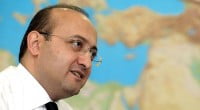Reflections from the US

Date posted: January 11, 2014
ARZU KAYA URANLI
These days, shocking events have been taking place one after another in Turkey. Watching what’s going on is very perplexing. Because Turkey is seven hours ahead, we in the United States have been waking up to shocking news, especially since Dec. 17, 2013, when news of alleged corruption in the current government spread.
At night, it’s hard for many people who love Turkey but live in the US to sleep, because while we sleep, there is always something new going on in Turkey. Our nights have been filled with nightmares. Some have been sleeping fewer hours than usual, and some have just been making efforts to ignore the situation. They think it’s better to not follow Turkish politics 24/7 in order to remain sane and sleep well.
However, with the heated political situation progressing rapidly, last week was exceptional. Since then, more people are probably sleepless because it is seemingly impossible to stay carefree with what’s going on. Turkey has had breaking news headlines countless times in the international media last week.
Just this week, Prime Minister Recep Tayyip Erdoğan’s Justice and Development Party (AK Party) dismissed hundreds of police officers, including more than a dozen high-ranking officials, prompting accusations of interference in the judicial process, In the past three weeks, the AK Party has proposed new laws to increase government controls over judges and prosecutors, and many investigations have slowed down, raising suspicions that the government might be trying to hide something.
A week ago, in Hatay province, Turkish intelligence didn’t let prosecutors and police search a truck suspected of carrying arms to Syrian rebels; the government of Turkey claims that it was humanitarian aid, and has removed the involved prosecutors and police from their positions.
Dan Bliefsky and Şebnem Arsu in The New York Times wrote last week, “The intervention in the ranks of law enforcement for what appear to be political motives, analysts said, underlines Mr. Erdogan’s [sic] encroaching authoritarianism after nearly a decade in power as well as his sense of panic ahead of pivotal local elections in March.”
While all those things continue to unfold, Mr. Erdoğan is accusing the investigation to be a politically motivated plot against his government from within the state, especially by the Hizmet movement, led by the highly influential Islamic scholar Fethullah Gülen. It’s no surprise that there are powerful sympathizers of Mr. Gülen within Turkey’s police force and judiciary, but Mr. Gülen’s followers do not accept accusations that his adherents control state institutions. However, Mr. Erdoğan insists that his view is fact and calls Gülen’s millions of followers around the world a “criminal gang.”
However, the recent arguments in Turkey seem more likely to be a “state crisis,” since the government is perceived to be impinging on the judicial branch, and the principle of separation of powers does not seem to be as intact as it should be in a democracy. Analysts say Mr. Erdoğan seeks to undermine the Gülen movement by trying to prevent the prosecutors from doing their job. Apparently, there is a persistent effort to ensure accountability, and the fact that the Gülen community is being accused of spearheading the prosecutions is being seen as unfair. It seems the main goal is to discredit the Hizmet movement in an attempt to cover up corruption.
In a Financial Times piece titled “Erdogan’s [sic] grip casts rule of law into question,” Daniel Dombey indicates, “It does not look like a legally sound state of affairs when the decision for a prosecution to go ahead is coming down to Mr Erdogan’s [sic] say-so as the country’s de facto chief legal arbiter. During a crackdown on protests last year, Turkey at times looked like Hungary, whose heavy-handed government has eroded the independence of state institutions in recent years. Today, it risks becoming more like Ukraine, where observers question whether the rule of law even applies.”
On the other hand, the Turkish lira has been falling to record lows against the dollar. There are three elections coming up: local elections in two months, a presidential election this summer and a general election next year. Foreign investors are nervous. Many of them fear that continuing events may cause political and economic instability in the country. It’s hard to predict where this political instability might go, but it seems that unless the AK Party changes its attitude, Erdoğan’s dream of elevating Turkey to be included on the list of the world’s top 10 economies by the centennial of the Turkish Republic will not come true.
Source: Todays Zaman , January 11, 2014
Tags: Defamation of Hizmet | Democracy | Freedoms | Hizmet (Gulen) movement | Turkey |
























